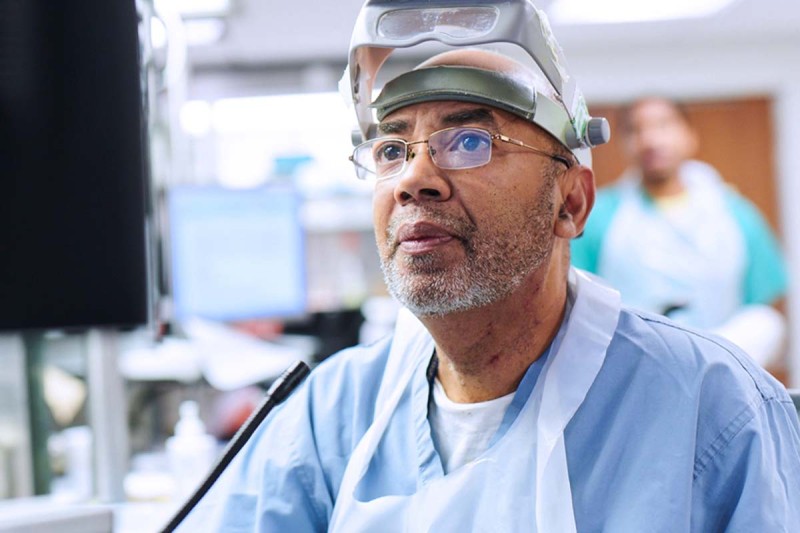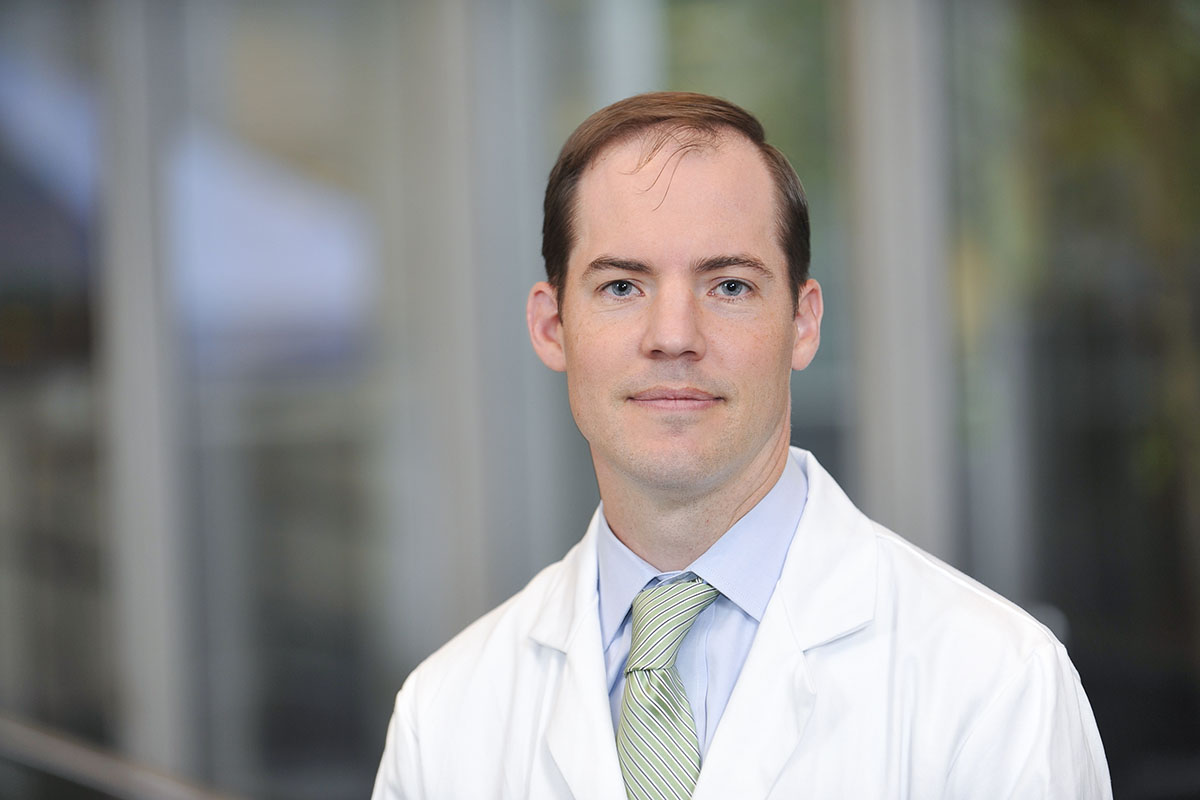
MSK has a large team of specialists who focus on sarcoma. Pictured above is pathology assistant Fausto Gonzalez, who works in the lab of sarcoma expert Cristina Antonescu.
As one of the world’s most respected comprehensive centers devoted exclusively to cancer, Memorial Sloan Kettering has entire teams that specialize in treating rare types of cancer. Sarcoma is one of those. It can appear in any part of the body’s connective tissue, which includes muscle, bone, nerves, blood vessels, and fat.
With current treatments — surgery alone or some combination of surgery, chemotherapy, and radiation therapy — about half of all sarcomas can be cured. But for the other half, the cancer will continue to grow and spread throughout the body, eventually reaching vital organs.
“Unfortunately, many patients with advanced disease have a poor outlook in terms of survival,” says MSK medical oncologist Ciara Kelly, who specializes in treating sarcoma. “We’re trying every day to improve the treatment options and care we provide our patients.” She and her colleagues on MSK’s sarcoma team are currently leading more than two dozen trials evaluating new treatments for sarcoma.
Where Rare Becomes Commonplace
Sarcoma is not actually one cancer, but more than 50 distinct types. Sarcoma tumors differ due to the variety of tissues from which they form as well as the range of genetic changes that drive them. Because these tumors are so diverse, there is no one-size-fits-all approach for developing better sarcoma treatments. Instead, new approaches are based on the specific characteristics of the various subtypes.
“At most other places in the country, a surgical oncologist will operate on many different kinds of cancer,” says surgeon Edmund (Ned) Bartlett, another member of MSK’s sarcoma team. “We have the luxury of being able to spend all of our time on the same type of cancer. It makes a big difference in understanding the ins and outs and nuances of this complicated disease.”
Advancing Immunotherapy Treatments
Drugs called checkpoint inhibitors are beginning to show promise in treating some aggressive types of sarcoma. This form of immunotherapy, which boosts the body’s natural immune response so it can go after cancer, has significantly changed the treatment of cancers such as melanoma and lung cancer, among other tumor types. Early research examining the drugs’ ability to target sarcoma was disappointing, but studies into why these treatments were not effective have led to new approaches.
Checkpoint inhibitors work better against “hot” tumors — those that already have a lot of immune cells around them. “But sarcomas tend to be ‘cold’ tumors. When we do biopsies, we don’t find a lot of inflammation present,” Dr. Bartlett says. “If we can perturb the tumors in some way and stimulate inflammation, immunotherapies may be more effective.”

“We have the luxury of being able to spend all of our time on the same type of cancer,” says sarcoma surgeon Edmund Bartlett.
Dr. Bartlett and his colleagues recently launched a phase II trial that combines immunotherapy with isolated limb infusion to treat certain types of sarcoma, including myxofibrosarcoma, undifferentiated pleomorphic sarcoma, and alveolar soft-part sarcoma. Isolated limb infusion is a procedure in which the arm or leg affected by a tumor is pumped full of high doses of chemotherapy, while a tourniquet prevents the drugs from reaching the rest of the body. The tumor becomes inflamed, making it easier for immune cells to find and attack it.
The trial is testing the effectiveness of giving the checkpoint inhibitor pembrolizumab (Keytruda®) to boost the immune response against the tumor. A study published by MSK investigators in 2018 showed this combination treatment can be effective in people with melanoma.
Dr. Kelly is leading another trial looking at how to heat up cold tumors. This one involves injecting the tumors with a modified virus called T-VEC, which causes tumor cells’ death and the release of tumor cell fragments into the bloodstream. This makes it easier for the immune system to find the tumor and exert its effect on other sites of the body where the tumor is present. Pembrolizumab is also used as the next step of treatment to stimulate the immune response. The trial is being offered for those with undifferentiated pleomorphic sarcoma/myxofibrosarcoma, cutaneous angiosarcoma, and epithelioid sarcoma, based on earlier work that suggested these sarcoma types had shown promising activity with this combination.
Dr. Kelly notes that many of her colleagues are also examining novel combination immunotherapy approaches in sarcoma, including Sandra D’Angelo, Sujana Movva, and Evan Rosenbaum. “At MSK, it’s our mission to expand treatment options for our patients, and I’m delighted to see the new trials opening now and in the coming months,” Dr. Kelly says.
Making Inroads with Targeted Therapy
Targeted therapy is another treatment approach that’s leading to advances against certain types of sarcoma. Dr. Kelly is running a phase II trial evaluating the effectiveness of the drug ivosidenib (Tibsovo®) in treating IDH1-mutant chondrosarcoma, a type of bone cancer. Ivosidenib is currently used to treat leukemias that carry a mutation called IDH1. About one-third of chondrosarcomas also have IDH1 mutations.

“At MSK, it’s our mission to expand treatment options for our patients,” says sarcoma specialist Ciara Kelly.
Dr. Kelly is also collaborating with MSK physician-scientist Ping Chi to develop targeted therapies for another rare sarcoma subtype, NF1-deficient malignant peripheral nerve sheath tumors (MPNST). This is a tumor that affects the lining of the nerves. “There have been very few trials for this disease, so we really appreciate all the work that Dr. Chi and her laboratory colleagues are doing to understand its biology,” Dr. Kelly says. The trial will look at a combination of the drugs ripretinib (QinlockTM) and binimetinib (Mektovi®) for people with this type of sarcoma.
Treating Sarcoma in the COVID-19 Era
Dr. Bartlett says that during the COVID-19 pandemic, many people with sarcoma have benefited from having some in-person appointments replaced with telemedicine visits. “There are many types of sarcoma where scans are the most important thing for monitoring how a patient is doing,” he says. “We can get patients scanned and then discuss their results with them by video chat or over the phone so they don’t have to come into the clinic. However, in cases where a physical exam is needed, we are able to do that quite safely.”
Telemedicine also allows people from outside the New York City area to easily arrange consultations with MSK doctors and learn whether they qualify for MSK’s clinical trials.
Dr. Kelly notes that MSK is continuing to expand its sarcoma team. “As science uncovers more details about the causes of sarcoma, there are opportunities for many more clinical trials,” she says. “We need to continue growing to meet that demand.”
For the trials mentioned above, Dr. Kelly has received funding from Amgen, Merck, Cycle for Survival, and Agios. Dr. Chi has received research funding from Deciphera and Pfizer for the trial that’s being co-led by Dr. Kelly. Dr. Bartlett’s trial is funded by a Cycle for Survival Equinox Innovation Award.









